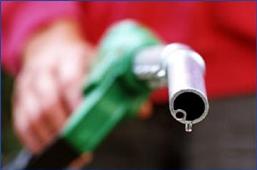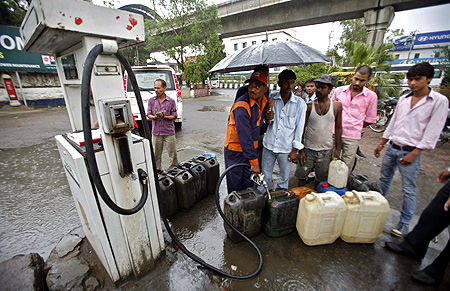It has been known for a long time that the first step towards fiscal consolidation, and thus to healthy public finances and a more stable macroeconomy, was to decrease the subsidy amount spent on diesel. On Thursday, Petroleum Minister Veerappa Moily said that the government had decided to allow the oil marketing companies to raise the price of diesel in small amounts, in order to reduce the losses OMCs make on selling the refined fuel.
On Thursday, Petroleum Minister Veerappa Moily said that the government had decided to allow the oil marketing companies to raise the price of diesel in small amounts, in order to reduce the losses OMCs make on selling the refined fuel.
Those losses, or 'under-recoveries', are of course eventually covered partly by the central government, and are the most potent contributor to India's problems with its fiscal deficit.
It has been known for a long time that the first step towards fiscal consolidation, and thus to healthy public finances and a more stable macroeconomy, was to decrease the subsidy amount spent on diesel.
The United Progressive Alliance government has dithered too long on diesel.
It was agreed, in principle, that deregulation should happen in mid-2010, when petrol was deregulated, and the prime minister has been calling for it in public since this time last year at least.
But that the decision has finally been taken is nevertheless welcome.
The UPA's intent should be applauded, even though allowing companies to charge market-linked prices from bulk users like defence, railways and cement plants is fraught with problems of leakage and diversion.
It is important to note that India's government has spent too much for too long on wasteful subsidies, and the diesel subsidy is perhaps the most wasteful of all.
It is the most poorly targeted of subsidies.
It is taken advantage of by car owners and generator users, who are among the richest Indians; while less well-off Indians using two-wheelers pay for their petrol at market-linked prices that are much higher.
This
Diesel is sold at almost Rs 10 a litre below the sustainable price for the fuel, and the annual bill for that to the central government comes to Rs 96,000 crore (Rs 960 billion).
The argument for the reduction in subsidy has always been unanswerable.
The only problem has been the United Progressive Alliance's political weakness, which it now has hopefully overcome.
The important part is that it has not been done by government fiat, but by allowing OMCs to set the price.
Also, it is not likely to happen in one massive leap, which would provide an unpleasant shock to the economy and may cause paralysing political protests and even perhaps a rollback of the measure.
The best way to go about such price rationalisation is through regular, small increases -- as has been done -- and it appears that the government has finally learnt.
However, it is vitally important to keep an eye on whether or not this freedom for OMCs is, in fact, for real.
India has been burnt by phony deregulation before; under the National Democratic Alliance government, fuel prices were declared to be freed up -- but when elections came near, the policy was given a quiet burial.
Ministerial control over price-setting was reasserted.
Mr Moily must do better than his predecessors, and exert self-control -- not guiding or pressuring the OMCs to lower prices, or keep them static for temporary political convenience.
It is only when people at large understand that the prices that hurt them are being set by market forces and by the companies, not by politicians -- when price-setting has been seen to be depoliticised -- that the government will escape the political cost that comes from the inevitable worldwide fuel price rises.
That is also when India's public finances will finally stabilise.
The job is well begun -- but only half done.












 © 2025
© 2025